你要的,我都有
Meet Everything You Need
——蒙式环境如何支持孩子的人类倾向
How Montessori Classroom Support Children in Their Effort To Develop The Human Tendency
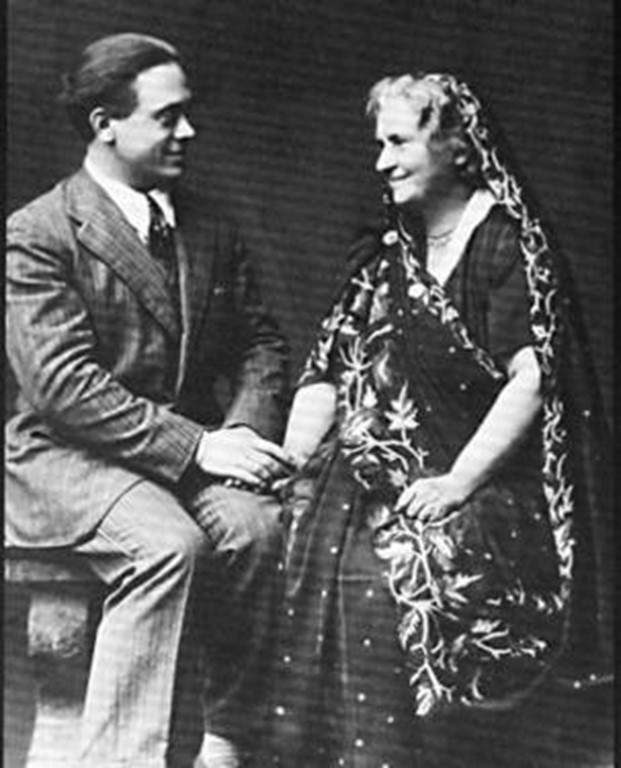
马里奥·蒙特梭利这样定义人类倾向:“人类有某些基本因素是恒定不变的,改变的只是我们赋予给心灵的东西(改变的是我们的精神食粮)。这些恒定不变的基本因素使得孩子们可以通过不同的行为模式融入任何社区,而这些基本因素就是当代心理学家所成的人类倾向。”
The definition of human tendency by Mario Montessori is: Some of the fundamental factors of human beings are constant, and what has changed is only the meaning we give to the mind (it can change our mental health). These constant fundamental factors enable children to integrate into any community through different behavior patterns, the contemporary psychologists defined these fundamental factors as the human tendency.
通俗的讲,正是人类倾向驱动着人类为了某个目的做出某种行为,这个目的首先是满足自身的生存以及生理需求,其次是满足我们的心理、情绪需求。
It is human tendency drives people to behave for certain purpose. This certain purpose normally will, in first place, satisfy people’s own survival instinct and physiological needs, and psychology and emotional needs will be followed.
这次,我们先将目光锁定在人类倾向中最基本的——探索、定向、秩序,让我们从儿童之家的日常起居,来看一间蒙特梭利教室,一位蒙特梭利老师,是如何支持孩子们以上三个人类倾向的发展。
Human tendency has three basic elements: Exploration, Orientation, and Discipline. This article will show us how Montessori class routine, Montessori classrooms, and Montessori teachers support children in their demand to develop these three human tendencies.
目之所及,皆可探索
Explore Everything Observable
当新生初次来到儿童之家,面对全新的环境,探索的人类倾向悄然启动。他需要知道在这个陌生的环境中,哪些人、事、物可以满足自己的需求,因此他必须不断在新环境中探索、试验。
The human tendency drives children to explore everything around them when they visit a new place — EYAS at first time. Constantly exploring new environment can help children know if there is anybody or anything in this unfamiliar environment can meet their needs.

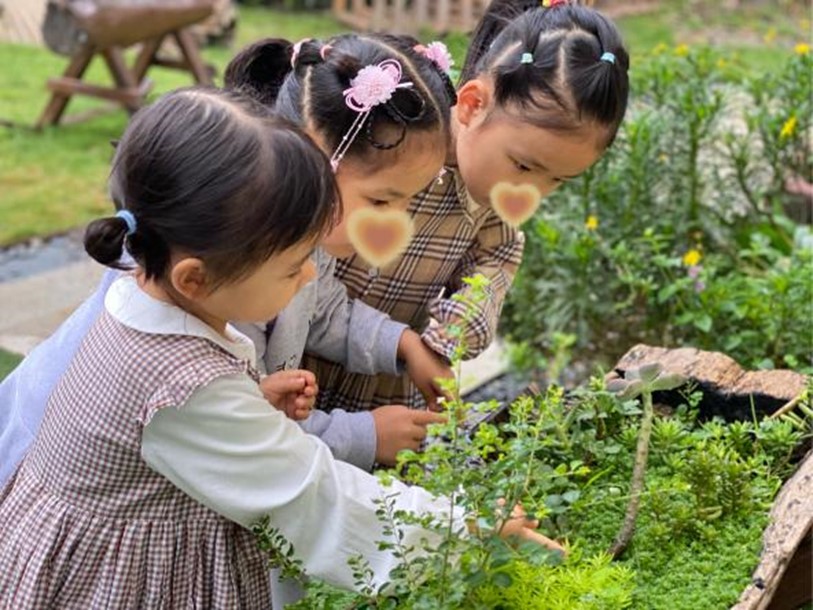
首先,清晨的户外活动为孩子提供了绝佳的探索时间。小朋友跟着小伙伴们滑滑梯、骑车子、照顾花园里的植物了……不知不觉已然认识了三两好友。玩耍中的探索,让孩子放下了心理的第一道防备。
The early morning outdoor activities provide the good opportunity for children to explore. They play slide, ride bikes, take care of the plants, and they make new friends naturally. Children will put down psychological defense unconsciously when they are playing or exploring.
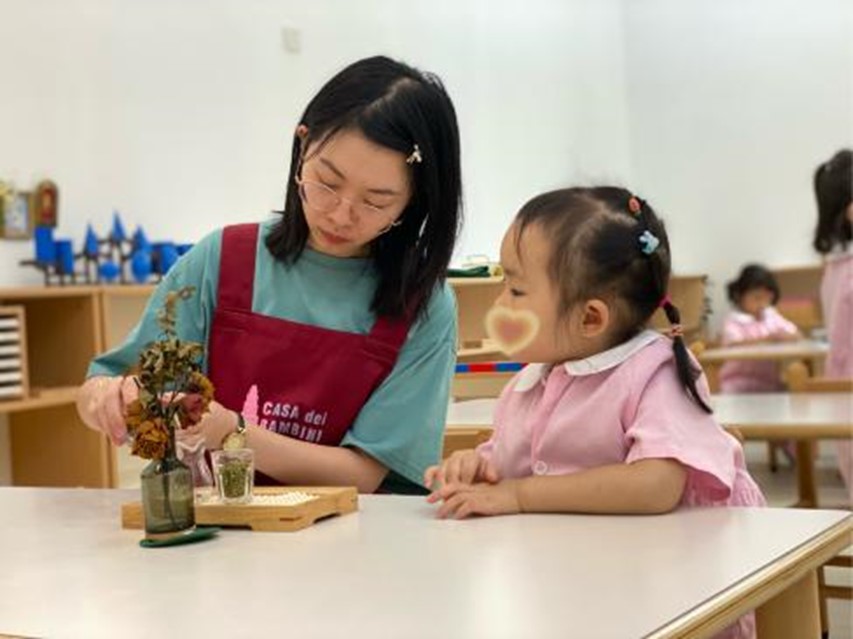
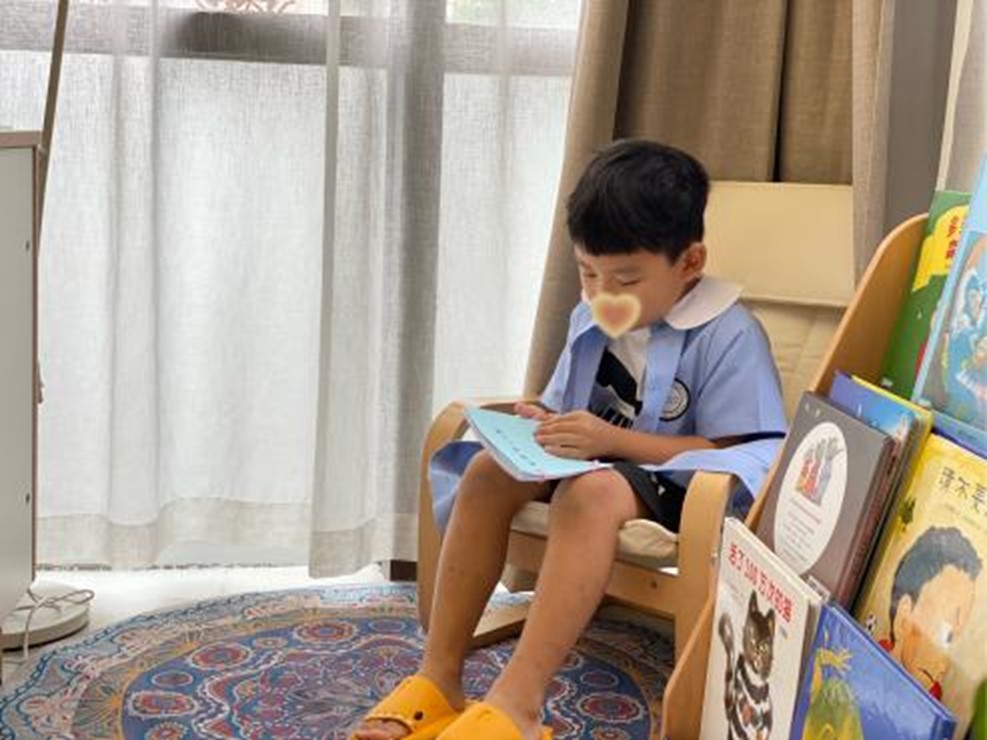
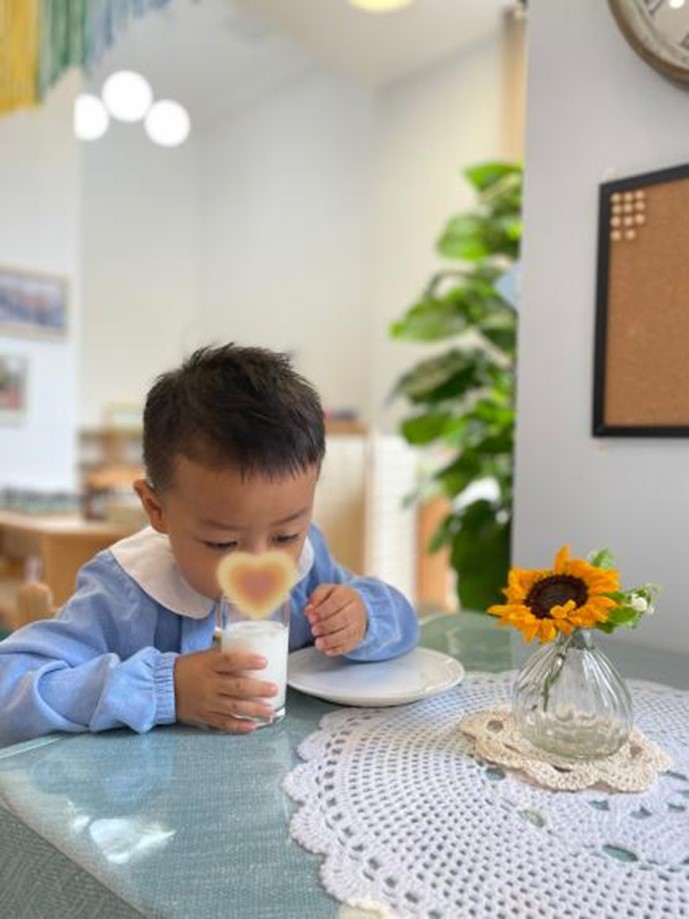
总之,环境中的一切,都在向这位新朋友伸出橄榄枝,告诉他,举凡你看的,你就可以探索。
Please explore anything that you like!
固定位置的舒适感
Comfortable Sensation and Position in Class
蒙特梭利环境友好地向孩子们提供了一切探索的可能,在探索中,孩子有了解自己位置的重要需求,他总是会想尽办法标记自己的位置。
Montessori environment provides children with all possibilities of exploration. A child has an important need to know his/her place in a new environment, so he/she will always try hard to mark his/her place when exploring the environment.
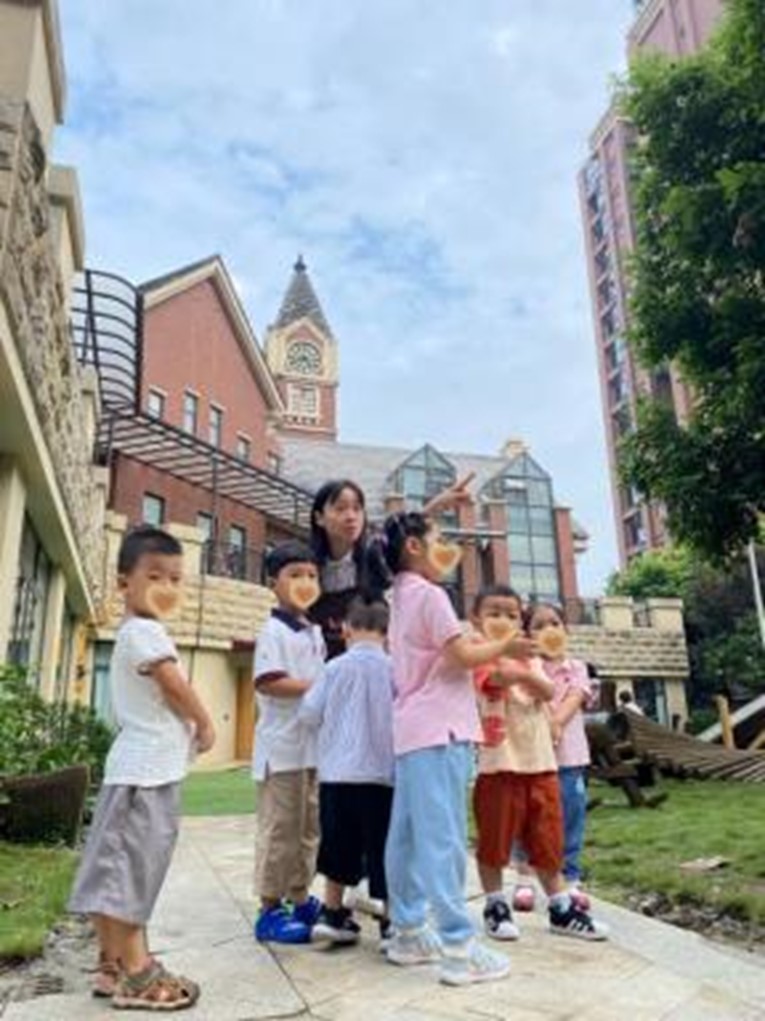
老师们总会第一时间托起他的小手,介绍教室乃至整栋教学楼里的各个功能区域。他将在哪里洗手、如厕、用餐、午休,当然,还有专属于他的各种收纳空间,鞋帽柜、作品柜、水杯柜等等。
Teachers will always introduce the environment (classrooms or even the whole school building) to children the first time they visit school, and thus they will have a clear picture about where the washrooms, eating areas, and sleeping rooms are. Of course, beside those public areas, children also have personal space to storage their shoes, works, water cup and so on.
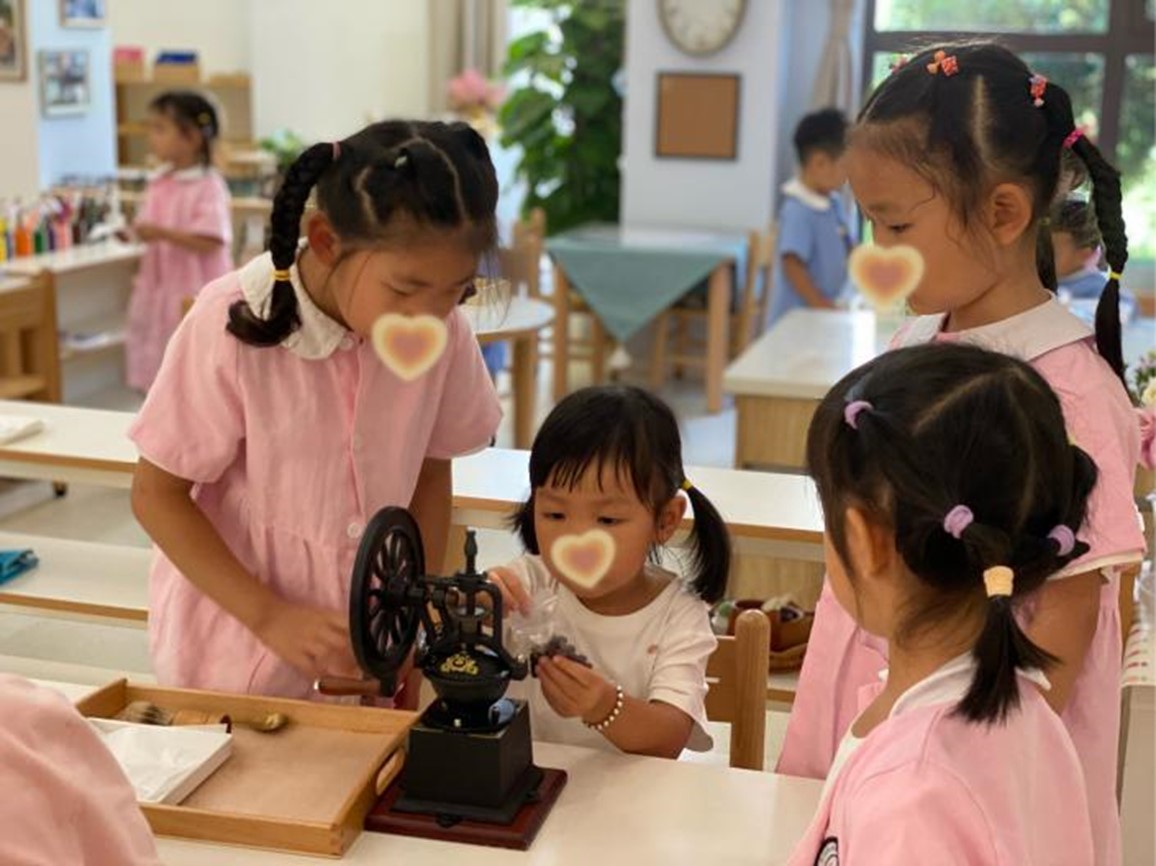
孩子通过注意环境中的物品,尤其是与自己紧密相关的事物为自己定位。当他找到新环境中某个熟悉的人、或者物品时,他们才能获得安全感和舒适感,以便自己慢慢适应这个全新的小天地。
Children position themselves by noticing objects in the environment, especially the objects that are closely relate to them. They gain a sense of safety and comfort when they find familiar people or objects in a new environment, and then they will start getting used to the new environment slowly.
心之所向,秩序使然
Discipline Brings Freedom
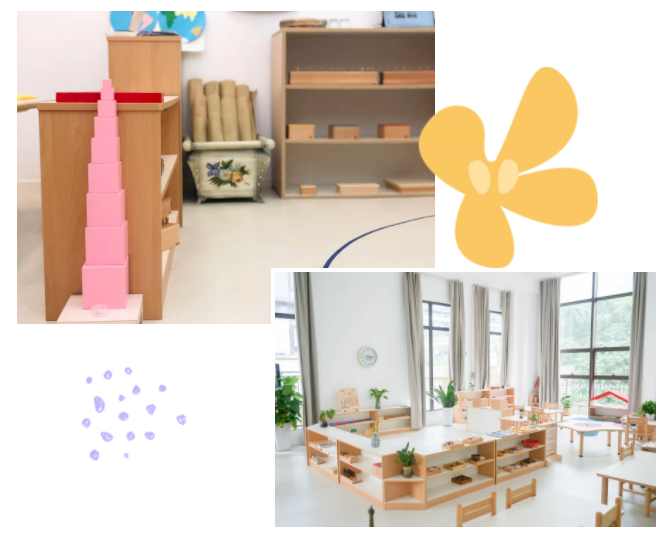
当这个小朋友已经借由环境中的事物标记自己的位置,如若这些事物总是没有秩序的随意乱放,那他如何定位自己呢?——这样的事,也许永远没有机会发生在一间蒙特梭利教室中。
When a child has learnt to locate himself / herself by referencing the position of objects in a new environment, how can they identify their position when these objects are placed out of order? However, it will never happen in a Montessori class.
蒙特梭利教室有五个区域,从这个五个区域的位置划分,到每个区域的每个工作,皆遵循着从易到难的原则,这是蒙特梭利环境的基础设定。
There are five areas in the Montessori classroom. No matter the division of five areas or the work arrangement in each area, they all must follow the principle: Easy to Difficult.
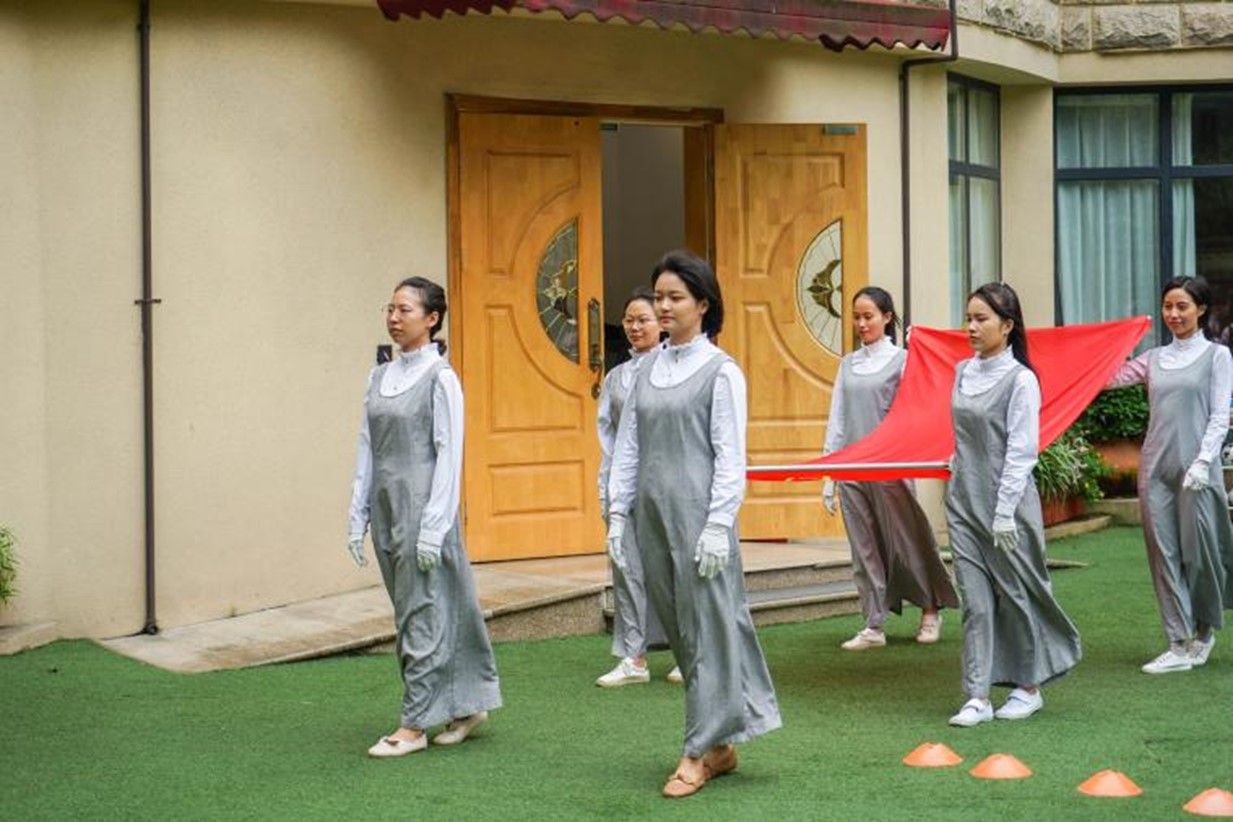
(儿童之家的重要仪式——每周一的升旗仪式)
(The weekly ceremony of EYAS - Flag-Raising Ceremony)
教室中的秩序不仅包括设施、物品的秩序,还包含了一周的例行仪式、一日流程中工作、用餐、午休、户外活动的顺序等,都按部就班地进行着。
The discipline in the classroom includes not only the order of facilities and objects, but also the daily routine. Every single detail and all activities are carried out step by step with following the daily routine every day.
因为幼儿在6岁之前,必须经由外部的秩序方能构建自身内在的秩序;因此蒙特梭利环境中的一切,才会被设计的秩序井然,恰恰就是在满足孩子们秩序的人类倾向。
It is the external order that helps a 0-6 years old child to build their internal discipline, therefore, everything in the Montessori environment is designed to be orderly to satisfy a child’s human tendency.
结语
Conclusion
孩子们探索、定位、秩序的人类倾向,是环环相扣的。因此老师们在打造一间蒙特梭利教室,以及在做自我预备时,也总是以孩子们最基本的这三个人类倾向作为首要考量、指导。
The three Human Tendencies -- Exploration, orientation and discipline are interrelated. Teachers should take these three elements as a reference when prepare a Montessori environment.
在此,希望读到这篇文章的各位家长也能跟随上述的三个人类倾向,自查一下家庭中的环境——作为孩子们环境中最重要的成人,我们都应该提供一个合适的环境,助力他们的成长。
Dear parents, we deeply hope you can follow the three human tendencies to check if there is a proper environment at home. As the person plays an important role in our children’s life, we should do everything to prepare a suitable environment for children’s growth.